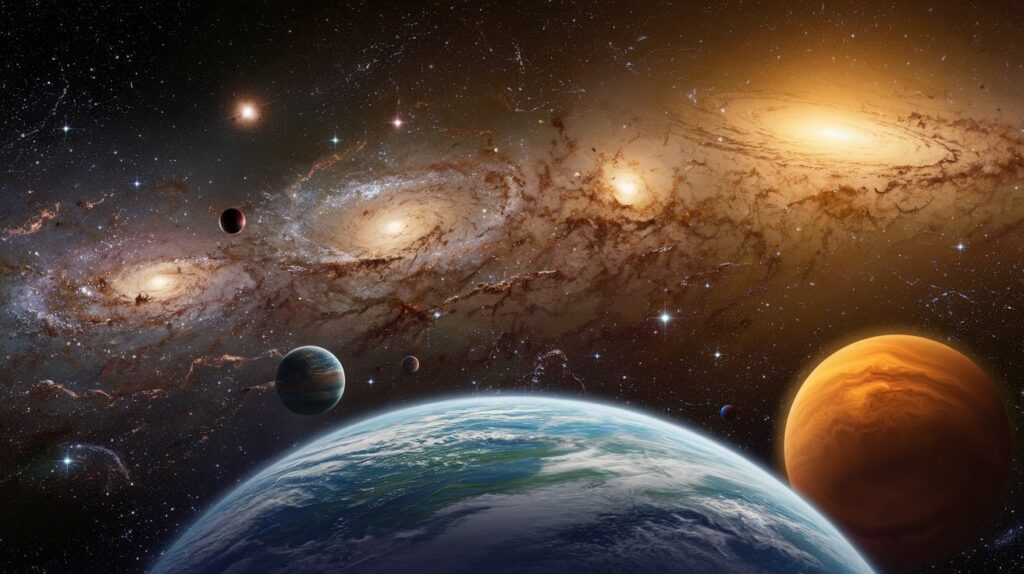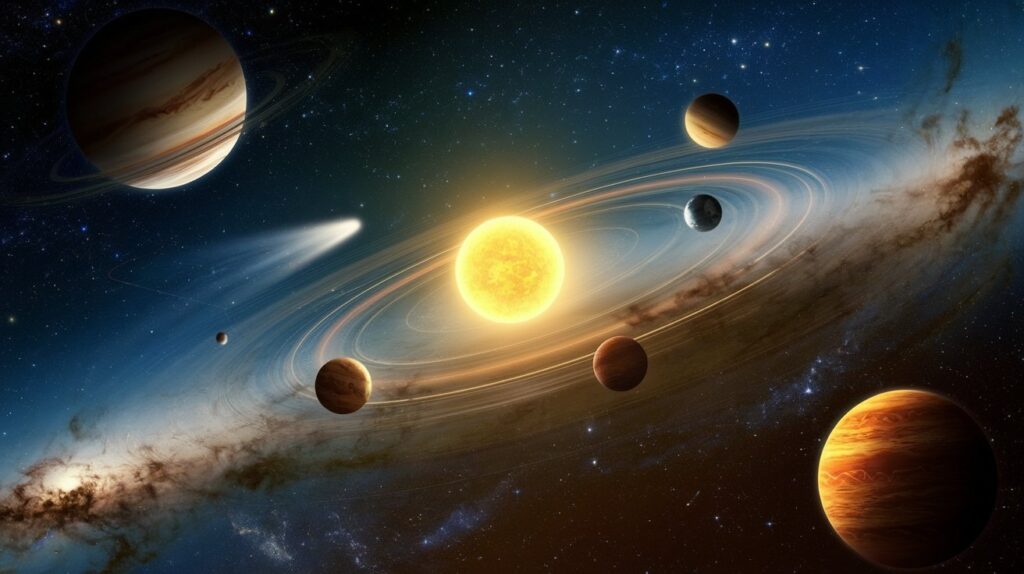Cosmology is a field that explores one of the biggest mysteries of all time: the origin, evolution, and fate of the universe. This vast subject answers profound questions about how the universe began, how it has changed over time, and what will eventually become of it. For centuries, humans have gazed at the stars, pondering their existence. Thanks to the remarkable progress of Cosmology, we now have a clearer understanding of the universe, though many questions still remain.

What is Cosmology?
At its core, Cosmology is the scientific study of the universe as a whole. It encompasses everything from the birth of the universe to its ultimate fate. Cosmologists use various methods, including observations and mathematical models, to understand the structure and history of the cosmos.
As a discipline, Cosmology seeks to answer three primary questions:
- Origin: How did the universe begin?
- Evolution: How has the universe changed since its inception?
- Fate: What will happen to the universe in the future?
Understanding these aspects allows us to unravel the mysteries of space, time, and matter on a cosmic scale.
The Big Bang Theory: The Beginning of the Universe
The Big Bang Theory is the most widely accepted explanation for the origin of the universe. According to this theory, about 13.8 billion years ago, the universe began as a singularity — a point of infinite density and temperature. This “Big Bang” was not an explosion in space; rather, it was an expansion of space itself.
Key Points of the Big Bang Theory:
- The universe started from a hot, dense state.
- Space expanded, allowing matter to form.
- This event marked the creation of time, space, and the laws of physics as we know them.
The Evolution of the Universe
After the Big Bang, the universe began to evolve, expanding and cooling down. As time passed, simple atoms formed, which eventually led to the creation of stars, galaxies, and planets.

Phases in the Universe’s Evolution:
| Phase | Timeline | Key Events |
|---|---|---|
| Big Bang | 13.8 billion years ago | Universe begins to expand. |
| Formation of Atoms | ~380,000 years after Big Bang | Protons and electrons combine to form hydrogen and helium. |
| First Stars and Galaxies | ~150 million years after Big Bang | Gravity pulls matter together, forming the first stars. |
| Galaxy Clusters | ~1 billion years after Big Bang | Galaxies group together, forming clusters. |
| Present Day | 13.8 billion years later | The universe continues to expand and evolve. |
The Fate of the Universe: What Comes Next?
One of the most intriguing questions in Cosmology is the ultimate fate of the universe. Several theories suggest different possible endings:
1. The Big Crunch
- In this scenario, the expansion of the universe eventually slows down, and gravity causes everything to collapse back into a singularity.
2. The Big Freeze (Heat Death)
- The most widely accepted fate is the Big Freeze, where the universe continues expanding forever. As it does, stars burn out, galaxies drift apart, and the universe cools down to a point where all matter and energy cease to exist in a useful form.
3. The Big Rip
- Some theorists suggest that the expansion of the universe could accelerate so much that it tears apart galaxies, stars, and eventually atoms.
Major Concepts in Cosmology
To understand Cosmology fully, it’s important to grasp some key concepts:
- Redshift: The stretching of light waves as they move away from us, indicating the expansion of the universe.
- Cosmic Microwave Background Radiation (CMB): The residual heat from the Big Bang, a critical piece of evidence supporting the Big Bang Theory.
- Dark Matter: Invisible matter that doesn’t emit light but has gravitational effects on galaxies.
- Dark Energy: A mysterious force driving the accelerated expansion of the universe.
Observing the Universe: Tools and Techniques
Cosmology relies heavily on observations of distant celestial objects. Over the years, several groundbreaking tools and techniques have revolutionized our understanding:
| Tool/Technique | Purpose | Examples |
|---|---|---|
| Telescopes | Observe distant stars and galaxies. | Hubble Space Telescope, James Webb Space Telescope |
| Spectroscopy | Analyze the light from celestial objects to determine their composition and movement. | Sloan Digital Sky Survey |
| Particle Accelerators | Simulate the conditions of the early universe. | Large Hadron Collider (LHC) |
| Supercomputers | Model the evolution of the universe using complex equations. | NASA’s Pleiades supercomputer |
Dark Matter and Dark Energy
One of the most perplexing aspects of Cosmology is the existence of dark matter and dark energy. Together, these make up about 95% of the universe, yet their nature remains largely a mystery.
- Dark Matter is believed to be the “glue” that holds galaxies together.
- Dark Energy is driving the accelerated expansion of the universe.
Despite our advancements in Cosmology, we have yet to directly observe either of these phenomena. However, their presence is inferred through their effects on visible matter and the expansion of the universe.
Conclusion
Cosmology is a fascinating field that offers insights into the deepest questions about our existence. From the Big Bang to the eventual fate of the universe, Cosmology continues to push the boundaries of human knowledge. As we develop more advanced tools and techniques, our understanding of the cosmos will only deepen.
“The universe is under no obligation to make sense to you.” – Neil deGrasse Tyson
Cosmologists will continue to explore the origin, evolution, and fate of the universe, helping us to comprehend the vast and mysterious cosmos in which we live.

Key Takeaways:
- Cosmology explores the origin, evolution, and fate of the universe.
- The Big Bang Theory is the leading explanation for the beginning of the universe.
- The universe is continuously expanding, possibly leading to outcomes like the Big Freeze, Big Crunch, or Big Rip.
- Dark Matter and Dark Energy remain some of the biggest mysteries in Cosmology.
- Cosmologists use advanced tools such as telescopes, particle accelerators, and supercomputers to study the universe.
Important Point
| NO. | Important Points |
| 1. | About Us |
| 2. | Contact Us |
| 3. | Disclaimer |
| 4. | Privacy Policy |
FAQs of Cosmology
What is Cosmology?
Cosmology is the study of the origin, evolution, and eventual fate of the universe.
How old is the universe?
According to the Big Bang Theory, the universe is approximately 13.8 billion years old.
What is the Big Bang Theory?
The Big Bang Theory suggests that the universe began as a hot, dense point that expanded and evolved into the cosmos we see today.
What is Dark Matter?
Dark Matter is an invisible form of matter that makes up about 27% of the universe and exerts gravitational forces on visible matter.
What is Dark Energy?
Dark Energy is a mysterious force responsible for the accelerated expansion of the universe, making up about 68% of the cosmos.
What tools do cosmologists use?
Cosmologists use telescopes, spectroscopy, particle accelerators, and supercomputers to study the universe.
What is redshift?
Redshift refers to the stretching of light waves as they move away from us, indicating the expansion of the universe.
What will happen to the universe in the future?
The fate of the universe could involve a Big Crunch, Big Freeze, or Big Rip, depending on the rate of expansion.
What is the Cosmic Microwave Background (CMB)?
The CMB is the afterglow of the Big Bang, providing crucial evidence for the expansion of the universe.
What is the difference between Astronomy and Cosmology?
While Astronomy studies celestial objects like stars and planets, Cosmology focuses on the universe as a whole, including its structure and history.
Will the universe ever stop expanding?
Current evidence suggests that the universe will continue expanding, but its ultimate fate depends on the nature of Dark Energy.
